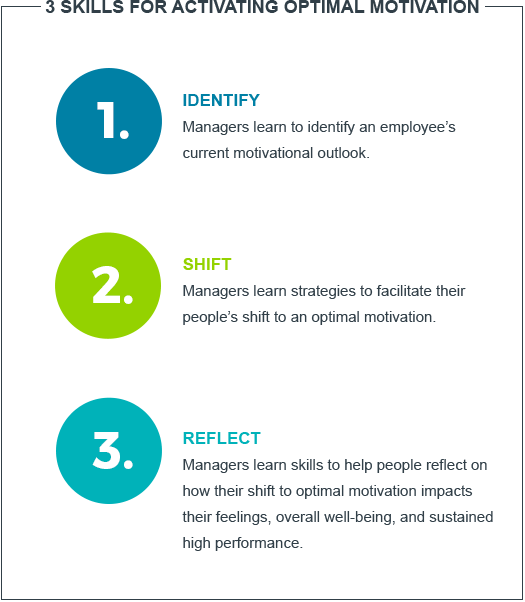by Rea Regan

Summary
1. Hone Your Motivational Skills
2. Communicate More & Effectively
3. Gratitude and Recognition Go a Long Way
4. Set Clear Goals
5. Don’t Be A Hypocrite
6. One-on-One Meetings Are Important
7. Delegate
8. Welcome New Ideas and Approaches
9. Don’t Avoid Problems
Wrapping Up Our Tips on Being a Better Manager
Gallup reported that one out of two employees will leave their job just to “get away” from their boss. The WBI U.S. Workplace Bullying Survey found that passive-aggressive managers make up around 61% of workplace bullies. Another surprising find is that employees stated low engagement was a top reason for leaving and that their relationship with their immediate manager was directly correlated to their engagement levels.
Judging by this data, managers can be a direct cause of motivation or frustration in the workplace. The choice lies solely with you on being a good leader.
Most managers are not just born into leadership roles, instead, good leaders make great managers for one key reason – they understand the golden ticket to effective management and success is having a solid relationship with his/her employees. Knowing that nothing can happen without a solid team is the first step to being a better manager.
Apart from recognizing these leadership faults, technology can play a huge part in overcoming these hurdles. In particular, employee management apps help keep everyone on the same page, celebrate success, offer recognition and so much more. With Connecteam’s employee management app, you and your team can do it all under one roof.
Now we know that no one is perfect, and there are always areas of improvement for managers. Changes may not happen overnight but with steady work and patience, you can lead your team to great heights. We highlight nine examples of poor leadership and how you can fix them.
9 Tips on Being a Better Manager
1. Hone Your Motivational Skills
Motivating your employees isn’t always the easiest task but it is crucial. As a manager, this is one skill you need to sharpen on a regular basis. With high employee morale, there is an increase in productivity and efficiency in the workplace. This leads employees to enjoy the atmosphere and company culture while being driven to work more efficiently and productively.
In order to motivate your team, and regularly, you need to foster a positive work environment and build a company culture that helps encourage employee morale so you can avoid drones from clocking in and out every day.

3 skills managers need to boost motivation for employees
https://www.kenblanchard.com/Products-Services/Optimal-Motivation
2. Communicate More & Effectively
Communication should be a two-way street. Your company isn’t a dictatorship so your voice isn’t the only one that should be heard. To really motivate your team and increase productivity, you need to listen to what your employees have to say.
Managers who are not good listeners lose good employees.
Bad managers speak more than they listen. When you’re the loudest voice in the room, it’s easy to forget that you hired a bunch of smart people that are more qualified to do their jobs than you are. Managers sometimes consider employee silence to be an indicator of agreement or an absence of ideas. However, employee silence is more likely due to feeling uncomfortable speaking. Perhaps they don’t want to interrupt a manager who leaves little room for others to speak, or they think their idea will go over poorly, or they don’t want to point out flaws in a manager’s plan. – Dave Lane, CEO of Inventiv
How to be a good manager in regards to communication? Give your employees a platform to be heard, they may have some amazing ideas about how to improve customer satisfaction, better the delivery time, a new marketing slogan, and more. Your employees are right in the thick of it every day so make sure you’re using your greatest asset.
Connecteam hosts a suggestion box so your employees can submit ideas, opinions, frustrations, and more whenever the situation arises.
Share positive announcements about the company, such as developing a new product or a glowing customer review. Your employees are human beings so treat them as such by looping them into matters that may affect them directly.
Check-in with them to understand how they’re getting on:
How do you feel about your job/manager/co-workers?
Are you up against any challenges? How can I help?
Are you happy at work? How can I help?
Connecteam makes it easy to send a private chat or you can send a company-wide survey and watch the results pour in real-time.
3. Gratitude and Recognition Go a Long Way
Employees really appreciate genuine and specific recognition from managers, senior management, and coworkers. They feel great in their job role and feel appreciated which leads to a happier, more productive employee – which only means a better bottom line.
Think about it, there are some employees out there who work in a job that doesn’t pay that great and the role itself might be mundane but they stay because they love their manager and their coworkers.
Being a good manager means knowing that gratitude and recognition go a long way.
tips for effective employee recognition infographic
https://visual.ly/community/infographic/business/tips-effective-employee-recognition
Never underestimate how powerful saying “Thank you” or “Well done,” to an employee really is. It’s a great motivator, sometimes even more than a pay raise or promotion.
Acknowledge a job well done publicly either in a speech, a quick word at the end of a meeting or send a company-wide message with Connecteam.
4. Set Clear Goals
Your employees can only do their best work if they have clear goals to follow.
“As leaders, it’s up to you to provide a clear but succinct picture of the vision and desired outcomes for the team and the organization. People connect to a project or task much easier if they know where it’s headed. Don’t keep them in the dark … Determine what information is important and then provide clear instructions and expectations to set them up for success – not failure,” Keisha A. Rivers, founder and chief outcome facilitator of The KARS Group Ltd.
It is vital that managers effectively delegate both the responsibility for completing the task and the authority required to get the job done. Whatever you do, don’t micromanage and control every little thing.
setting effective goals infographpic
https://www.rhythmsystems.com/blog/goal-setting-101-how-to-write-an-effective-priority-infographic
Simply assign the task and trust that your team will get the job done. This is the only way you can ensure that your employees are confident in their skills to complete the task at hand.
It’s vital that you and your employees create realistic goals together. Being a good manager means being totally transparent in what you expect from them and discussing what’s the best way to go about completing the task. Only then will you and your employees create an action plan that works for you both.
5. Don’t Be A Hypocrite
As a leader, you don’t want to fall into the trap of “do what I say and not as I do.” You must set an example if. If you want your team to respect and listen to you then you have to follow your own rules, that’s how to be a good manager 101. It doesn’t make any sense to hold your employees accountable if you aren’t working just as hard.
A leader must have the utmost and highest level of integrity and model the way for their team. If you leave early during the workday or speak offhand about a colleague, it will likely be repeated by your direct reports. To avoid this, a leader needs to clarify their values and be hyper-aware of their behavior and hold themselves to the same or higher standards that you would direct reports. – Daniel Freschi, president of leadership development company EDGE
If you believe that people will follow you because you have the power to tell them what to do, then you have just learned why so many top talents leave your company.
Leaders often want to create a certain type of environment, but don’t want to actually participate in the culture they are determined to create. If you are seeking to create a collaborative environment, ask yourself first if you are collaborating and sharing with others. Putting yourself in everyone else’s shoes will pay dividends.
6. One-on-One Meetings Are Important
Regardless of tight your schedule is, you must make time for your employees. Apart from holding team meetings, make sure you carve out room for one-on-one meetings as well.
optimizing one-on-one meetings
https://www.ragan.com/how-to-optimize-one-on-one-meetings/
While it may feel time-consuming, the return on investment is strong and massive. Regular conversations with managers help to develop trust, both with individuals and within their teams. This leads to more trust in the workplace, brings teams together, creates a fun and safe environment, and leads to better collaboration.
In addition, one-on-one meetings are a great way for leaders to hone their management skills. You learn how to actively listen and provide needed guidance and feedback along the way. By being a good manager, leaders help build better employee performance and improve the overall success of their team.
7. Delegate
Three types of managers exist in this case:
Those who do everything,
Those who do practically nothing, and
Those who strategically delegate.
It’s pretty clear which manager you should aspire to be.
When it comes to delegating tasks, it’s important that you know your team, their skills, and their talents. By harnessing their individual strengths, you ensure the task you delegate is done by the very best.
As a leader, this means two things – one, you need to know how to delegate and two, who to delegate to.
4 steps to delegate better infographic
https://titaniumsuccess.com/podcast/delegating-as-a-ceo/
8. Welcome New Ideas and Approaches
Most managers are cautious when taking risks and trying new methods and approaches. After all, if anything doesn’t pan out then they’re on the hook. However, welcoming and trying new ideas and approaches is a huge part of being a good manager.
You have to take controlled risks so the company can grow. The most successful companies have managers who are flexible, open to change, can adapt to change and are interested to hear new ideas.
Don’t forget that some of the best ideas out there may very well lie with your employees! After all, they’re in the thick of it each and every day so they usually have great ideas when it comes to improvements or innovations – and it’s important that you listen. By listening to your employees’ ideas, you help employee retention from going south.
With Connecteam, you can enable the suggestion box so employees can easily send ideas and approaches whenever there’s a lightbulb moment.
9. Don’t Avoid Problems
Being a good manager means never tiptoeing around problems. It’s important that you face issues head-on and compile solutions before it spirals out of control.
Sometimes the answer to the problem can be an uncomfortable one, like poor employee talent, squabbles amongst employees, low budget, and so on. It’s up to you to come up with a solution so don’t just hope and wait because it all falls on your lap and no one else’s. Be proactive and make sure your team has the skills to resolve the issues. Drama and hysteria will only hurt productivity, motivation, and employee engagement.
Wrapping Up Our Tips on Being a Better Manager
Poor management skills have disastrous long-term effects and may even infect the entire company. There are no bounds when it comes to toxic and misguided leadership. Strong leaders that have good management skills can and will positively impact a company, such as reducing turnover, improving morale, and betting employee engagement and productivity. Management has to lead by example and foster a positive working environment so that employees can perform at their best capacity.
Link: https://connecteam.com/being-a-good-manager/?fbclid=IwAR3_08PlUW_kfO11wSJV1yOhAq1EqjZ0SZgR7D4DTgZbLfK_9CnXD8yXntQ